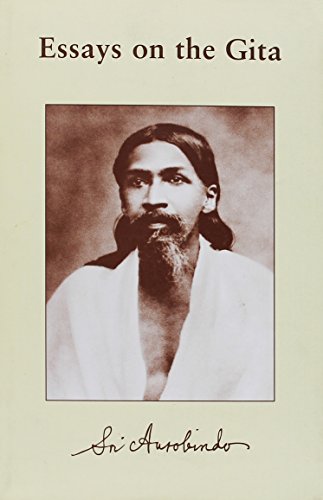ESSAYS ON THE GITA (PB)
Sri Aurobindo was born in Calcutta on 15 August 1872. At the age of seven he was taken to England for education. There he studied at St. Paul's School, London, and at King's College, Cambridge. Returning to India in 1893, he worked for the next thirteen years in the Princely State of Baroda in the service of the Maharaja and as a professor in Baroda College. During this period he also joined a revolutionary society and took a leading role in secret preparations for an uprising against the British Government in India. In 1906, soon after the Partition of Bengal, Sri Aurobindo quit his post in Baroda and went to Calcutta, where he soon became one of the leaders of the Nationalist movement. He was the first political leader in India to openly put forward, in his newspaper Bande Mataram, the idea of complete independence for the country. Prosecuted twice for sedition and once for conspiracy, he was released each time for lack of evidence. Sri Aurobindo had begun the practice of Yoga in 1905 in Baroda. In 1908 he had the first of several fundamental spiritual realisations. In 1910 he withdrew from politics and went to Pondicherry in order to devote himself entirely to his inner spiritual life and work. During his forty years in Pondicherry he evolved a new method of spiritual practice, which he called the Integral Yoga. Its aim is a spiritual realisation that not only liberates man's consciousness but also transforms his nature. In 1926, with the help of his spiritual collaborator, the Mother, he founded the Sri Aurobindo Ashram. Among his many writings are The Life Divine, The Synthesis of Yoga and Savitri. Sri Aurobindo left his body on 5 December 1950. ... Read more Read less
An exposition of the spiritual philosophy and method of self-discipline of the Bhagavad Gita. "Almost all spiritual problems have been briefly but deeply dealt with in the Gita", Sri Aurobindo remarked to a disciple, "and I have tried to bring all that out fully in the Essays". In his estimation the Gita is a great work of spiritual synthesis, for it built a "harmony between the three great means and powers, Love, Knowledge and Works, through which the soul of man can directly approach and cast itself into the Eternal." "Our object in studying the Gita", Sri Aurobindo wrote, "will not be a scholastic or academical scrutiny of its thought, nor to place its philosophy in the history of metaphysical speculation, nor shall we deal with it in the manner of the analytical dialectician. We approach it for help and light and our aim must be to distinguish its essential and living message, that in it on which humanity has to seize for its perfection and its highest spiritual welfare." Contents: Our Demand and Need from the Gita; The Divine Teacher, The Core of the Teaching; Man and the Battle of Life; Sankhya and Yoga; Equality and Knowledge; Above the Gunas; The Supreme Secret; etc. ... Read more Read less











